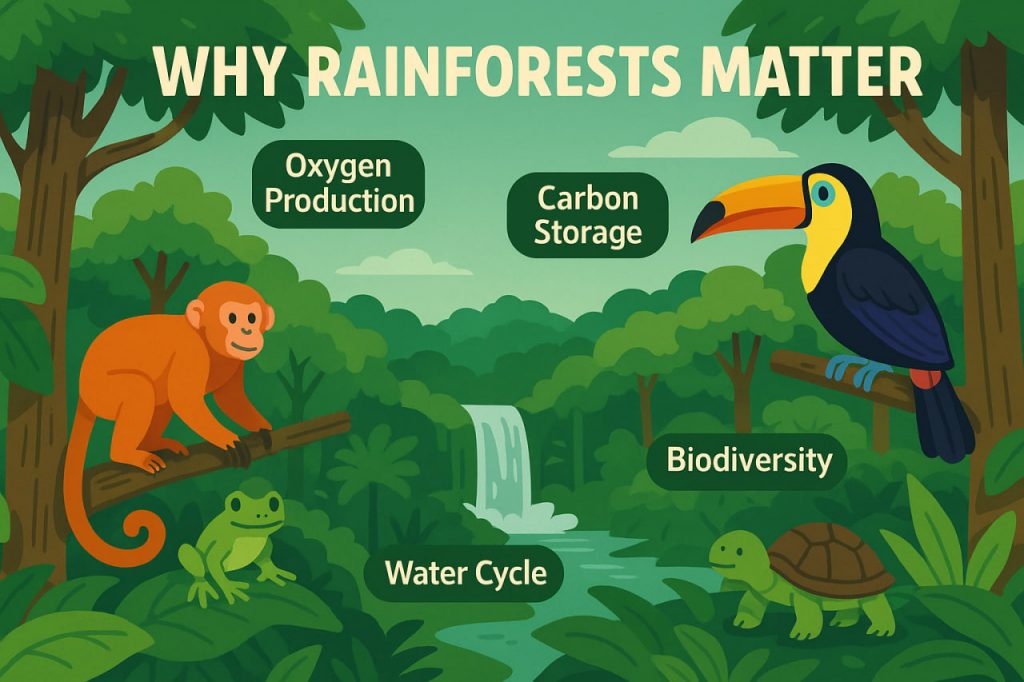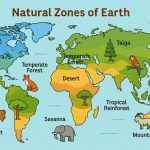Rainforests are among the most vibrant and essential ecosystems on our planet. Although they cover only about 6% of Earth’s surface, they support over half of all known species of plants and animals. Their value goes far beyond biodiversity—they play a vital role in regulating climate, preserving freshwater, and even supporting human life.
What Are Rainforests?
Rainforests are dense, evergreen forests found in tropical regions near the equator, such as the Amazon Basin in South America, the Congo in Africa, and parts of Southeast Asia. They receive at least 2,000 mm (80 inches) of rainfall annually and maintain warm temperatures year-round.
There are two main types:
- Tropical rainforests – warm, humid, and located near the equator
- Temperate rainforests – cooler, often coastal, found in regions like the Pacific Northwest
Why Are Rainforests Important?
1. Biodiversity Hotspots
Rainforests are home to an astonishing variety of species, many of which are not found anywhere else. This includes:
- 40,000+ species of plants
- 1,300+ bird species
- Millions of insects
- Iconic animals like jaguars, toucans, and orangutans
2. Climate Regulation
Rainforests help regulate global temperatures and rainfall patterns. Through a process called transpiration, trees release moisture into the air, creating clouds and rain—not only locally, but influencing weather worldwide.
3. Carbon Storage and the Fight Against Climate Change
Rainforests absorb and store huge amounts of carbon dioxide (CO₂), a major greenhouse gas. Without them, climate change would accelerate even more rapidly.
4. Source of Oxygen
Rainforests are often called the “lungs of the Earth” because they release oxygen through photosynthesis. While oceans produce more oxygen overall, forests play a critical regional role in maintaining air quality.
5. Water Cycle and Freshwater Supply
Tropical forests store water and release it back into the atmosphere, supporting rainfall across entire continents. The Amazon, for example, helps provide rain for Brazil, Argentina, and even the United States.
6. Medicines and Resources
Many modern medicines originate from rainforest plants, including treatments for cancer, malaria, and infections. Only a small fraction of species have been studied, suggesting vast untapped potential.
7. Indigenous Cultures and Livelihoods
Millions of indigenous people live in rainforests and depend on them for food, shelter, medicine, and cultural identity. Protecting forests also protects these communities.
Threats to Rainforests
Unfortunately, rainforests are disappearing rapidly due to:
- Deforestation for agriculture, especially cattle and soy
- Illegal logging
- Mining and oil extraction
- Infrastructure projects like roads and dams
- Fires, both natural and human-caused
The Amazon Rainforest alone loses thousands of square kilometers every year, affecting biodiversity, global climate, and indigenous rights.
How Can We Protect Them?
- Support sustainable products (e.g., certified wood, shade-grown coffee)
- Avoid products linked to deforestation, like palm oil from non-sustainable sources
- Donate to or support conservation organizations
- Raise awareness about the importance of forests
- Pressure governments and companies to enforce environmental protections
Conclusion
Rainforests are vital to life on Earth. They stabilize the climate, house incredible biodiversity, produce oxygen, and support countless human communities. Protecting them isn’t just an environmental issue—it’s a global responsibility.
Glossary
- Biodiversity: The variety of life in a specific habitat or ecosystem
- Carbon dioxide (CO₂): A greenhouse gas that contributes to global warming
- Transpiration: The process by which plants release water vapor into the air
- Deforestation: The removal of trees and forest cover
- Indigenous people: Native communities living traditionally in specific regions


